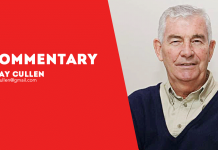
BY FR. SHAY CULLEN
PROTECTION, healing and empowerment are the most important services needed to help the victims and stop human trafficking but they are not available in most cases.
When a case does get to court, the delaying tactics by the defence, where endless postponements, allowed by complicit judges, frustrate the victim witness and they give up attending hearings not having testified. They are vulnerable to threats or a payoff.
As a result, hundreds of legal cases are dismissed – for lack of evidence – to the frustration of law enforcers.
Some other traffickers can recruit the victims again and they return to sex work to pay off debts.
The anti-trafficking law needs review and a new section must be added that says victims must be given specified therapeutic care, protection, and professional intervention. This has to be for a time and the victim financially compensated while in the therapeutic centre for a longer period of time until they have healed and are empowered to testify in court. Then they will be provided with aftercare, education and livelihood.
There are some success stories, however. Most of the girls in the Preda Foundation Home for trafficked and abused children belong to dysfunctional families and were victims of domestic abuse and violence from an early age.
These neglected and abused children then take to the streets to survive and to find freedom from the beatings and sexual abuse in their homes. On the streets, they are most vulnerable to unscrupulous traffickers who pick them up, offer them money, food, clothes, jobs and cheap smart phones. That puts them in the power of the traffickers.
When five girls aged 14 to 16 were trafficked by Michael Macaranas in Subic, he brought them to his house and with other men abused them sexually many times.
After a tip off, they were rescued by agents of the National Bureau of Investigation (NBI) and put under the protective custody of the Preda Foundation. They were protected, cared for, had many months of therapy and were healed from trauma and empowered to testify against their trafficker Michael Macaranas.
He was convicted on two counts of trafficking and was sentenced to life in prison and to pay his victims moral and exemplary damages which he never did.
The Preda aftercare helped the victims finish school and lead a happier, better life. That was one more conviction in the annual success rate of an average of 15 convictions by the Preda children.
That’s because the victims were healed after a few months of Emotional Release Therapy and were self-confident and changed young girls. Their testimony was direct, clear and convincing.
In her decision dated October 7, 2019, Judge Ma. Cristina J. Mendoza-Pizarro conducted a no-nonsense speedy trial, brooked no delaying tactics and noted that the defence of consent did not apply as the minors were forced and tricked into the sexual exploitation, a noteworthy decision.
What is needed is a law mandating a speedy trial for traffickers and care, protection, healing, and early presentation of the testimony of the victims of sexual abuse and exploitation. Marathon hearings with no delays, such as the practice in the Olongapo City Family Court under Judge Gemma Theresa Hilario-Logronio.
Where justice is delivered without fear or favour, with support and long-term care and after care for victims, many more traffickers and child rapists will be convicted. This is the change that must come. (www.preda.org)/PN

